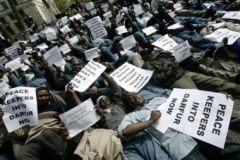What next in Darfur?
By AZAM S. AHMED
WASHINGTON, June 9, 2005 (UPI) — Talks between the Sudanese government and Darfur rebels taking place in the Nigerian capital, Abuja, meant to end the violence that has claimed more than 180,000 lives has brought renewed focus on a conflict the Bush administration has called “genocide.”

|
|
Protesters and refugees from Darfur, Sudan lay in the street to symbolize the dead outside 10 Downing Street in central London, Monday May 2, 2005. (AP). |
Jan Pronk, U.N. Secretary-General Kofi Annan’s envoy to Sudan, said Thursday in the Sudanese capital Khartoum that talks between the two sides should be conducted behind closed doors and exclude other parties, including Western nations and neighbors. That comments is likely to go a long way to satisfy both the government and the rebels, who both oppose the presence of outside parties.
Sudan does not want Eritrea present whom it accuses of backing the rebels, while the insurgents don’t want Chad participating, because they say it supports Sudan.
The Sudanese government is accused of supporting and arming Arab militias known as the Janjaweed in Darfur in their campaign against African tribes in the western part of the country.
The humanitarian crisis has left 2.4 million displaced and between 180,000 and 300,000 dead. Description of the violence has ranged from “ethnic cleansing,” the term used by the United Nations, to “genocide,” used by the Bush administration.
Critics, however, place little hope in the talks. Khartoum is run by an exclusively Arab government, which has often been accused of ignoring the needs and rights of the Black tribes in the west and south of the country.
In a separate conflict that has been raging for the past 21 years, John Garang and the Sudanese People’s Liberation Army, a guerrilla force based in the south of the country, fought the government in a civil war that claimed about 2 million lives. In January the Comprehensive Peace Agreement was signed, outlining details for a final cease-fire and shared power and oil revenues. Under the deal, Garang becomes vice president of Sudan and the leader of the South Sudan.
Experts hope Garang can bring about a peaceful solution in Darfur, and he has committed himself to the task once he joins the new government in Khartoum. In comments in Washington last week, the former rebel leader outlined several agendas for the new government he hopes to form. His first priority is Darfur.
“The task of the new government is to make sure we arrive at a just political agreement to solve the crisis in Darfur,” he said.
He asserted several times that he, under the peace deal, was forming a new government not joining the old one, which he accused of using those same tactics in Darfur as it did against the south.
“The strategies and tactics are the same,” he said. “The central problem in Darfur is the government’s use of ethnic groups to commit the killings.”
He outlined three issues for Darfur he intends to focus on once he is a part of the new government: Humanitarian relief to the millions of displaced, security from the Janjaweed, and political solutions because the international community would not support Darfur forever.
It is “untenable and unacceptable to have peace in one section and war in another,” he said.
The Bush administration has also said that it will normalize relations with Sudan only after it resolves the Darfur issue.
But critics question if the peace in the south will last to sustain any peaceable solution to Darfur. Sudan has been at war for more than 20 years, and Darfur conflict adds to its problems.
Garang responds by pointing out two differences he says will ensure change. First, the SPLA will retain its arms because it will be integrated into the Sudanese army and this will ensure that the government cannot dishonor the agreement. The second difference he notes is that the south will be fully autonomous, will be entitled to 50 percent of oil revenue and have the right of taxation among other things.
Despite this critics argue the transition won’t be easy.
“If left to the political will of the regime in Khartoum the deal will fail,” said John Prendergast of the International Crisis Group. “As long as the international community places pressure on the agreement, it has a fighting chance.”
Prendergast said with the goals Garang has set out to achieve, and with the inevitable slow integration of the Southern government into Khartoum, scheduled to take place in June, Garang may not be able to deliver as fast he would like on Darfur.
“Garang has got a lot of goals. Putting together a government in Southern Sudan, finding qualified people, and then the huge endeavor of rebuilding the South.” he said. “The haltingly slow and conflicted implementation (of the peace plan) where the two parties are constantly at odds will have a negative effect on Garang’s efforts to help Darfur.”
Jim Phillips of the Heritage Foundation said international pressure was essential to ensure peace is preserved.
“We must maintain firm international pressure to make sure the current government doesn’t fall back on its present deal,” he said. “Neither the U.S. nor Sudan should be complacent.”
